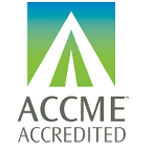Continuing Medical Education
Accreditation Statement

The American Association for Cancer Research (AACR) is accredited by the Accreditation Council for Continuing Medical Education (ACCME) to provide continuing medical education activities for physicians.
Credit Designation Statement
AACR has designated this live activity for a maximum of 19.0 AMA PRA Category 1 Credit(s)™. Physicians should only claim credit commensurate with the extent of their participation in the activity.
Credit certification for individual sessions may vary, dependent upon compliance with the ACCME Accreditation Criteria. The final number of credits may vary from the maximum number indicated above.
Claiming (CME) Credit
Physicians and other health care professionals seeking AMA PRA Category 1 Credit(s)TM for this live continuing medical education activity must complete the online CME Request for Credit Survey by Sunday, December 29, 2024. Certificates will only be issued to those who complete the survey. Your CME certificate will be sent to you via email after the completion of the activity.

Successful completion of this CME activity, which includes participation in the evaluation component, enables the participant to earn up to 19.0 Medical Knowledge MOC points in the American Board of Internal Medicine’s (ABIM) Maintenance of Certification (MOC) program. Participants will earn MOC points equivalent to the amount of CME credits claimed for the activity. It is the CME activity provider’s responsibility to submit participant completion information to ACCME for the purpose of granting ABIM MOC credit.
To receive ABIM MOC, participants must request MOC in the CME Request for Credit Survey and complete all questions. Once these steps are completed, AACR will submit your completion information via the ACCME’s Program and Activity Reporting System for the purpose of granting MOC points.
Statement of Educational Need, Target Audience, and Learning Objectives
The liquid biopsy concept has been introduced for CTCs 10 years ago and rapidly extended to ctDNA and other tumor-derived products such as circulating cell free-RNA (noncoding and messenger RNA), extracellular vesicles or tumor-educated platelets. Research on the two key components of liquid biopsy assays, CTCs and ctDNA, is a very active field of translational research with obvious clinical implications. Strong evidence for CTCs and ctDNA as prognostic markers has been documented many tumor entities including breast, prostate, lung and colorectal cancer. In ongoing interventional studies, the clinical utility of CTCs and ctDNA for treatment decisions is being evaluated with promising first results. In particular, the use of CTCs and ctDNA as real-time liquid biopsy to assess the dynamic changes of tumor evolution in response to cancer therapies has received attention over the past years.
This conference will focus on the technology, biology and in particular the current and future clinical applications of liquid biomarkers in patients with solid tumors and will discuss the unresolved issues in CTC and ctDNA research including the biology behind CTC and ctDNA shedding into the blood and other body fluids. We will focus on studies using blood for CTC and ctDNA analyses but the liquid biopsy concept can be expanded to other analytes (e.g., circulating RNAs or proteins) and other body fluids including urine, cerebrospinal fluid (CSF), bone marrow, saliva or sputum.
Clinical application will include early detection of primary cancer and minimal residual disease, surveillance by sequential blood analysis following the initial treatment, assessment of response to therapy and early detection of resistance to therapy in cancer patients.
The target audience for this conference is basic and translational scientists, both senior and young investigators with an interest in liquid biopsy (e.g., CTC, ctDNA, EVs), as well as clinicians with an interest in using liquid biopsy in clinical practice.
After participating in this CME activity, physicians should be able to:
- Identify potentials and limitations of current technologies of Liquid Biopsy assays
- Interpret the biology behind LB markers (e.g., shedding of ctDNA & CTC and EVs)
- Articulate the clinical applications of Liquid Biopsy markers in the context of tumor development, progression and cancer therapy
- Assess the potential of LB markers for personalized medicine
- Explain the scientific and regulatory requirements for the implementation of LB markers into clinic practice
Disclosure Statement
It is the policy of the AACR that the information presented at AACR CME activities will be unbiased and based on scientific evidence. To help participants make judgments about the presence of bias, AACR will provide information that Scientific Program Committee members and speakers have disclosed all financial relationships they have with ineligible companies whose primary business is producing, marketing, selling, re-selling, or distributing healthcare products or services used by or on patients. All of the relevant financial relationships for these individuals have been mitigated.
Acknowledgment of Financial or Other Support
The AACR gratefully acknowledges the following commercial supporters for their Professional Educational Grants:
- Pfizer
Questions about CME?
Please read our frequently asked questions. If you still have questions, contact the Office of CME at (215) 440-9300 or [email protected].
